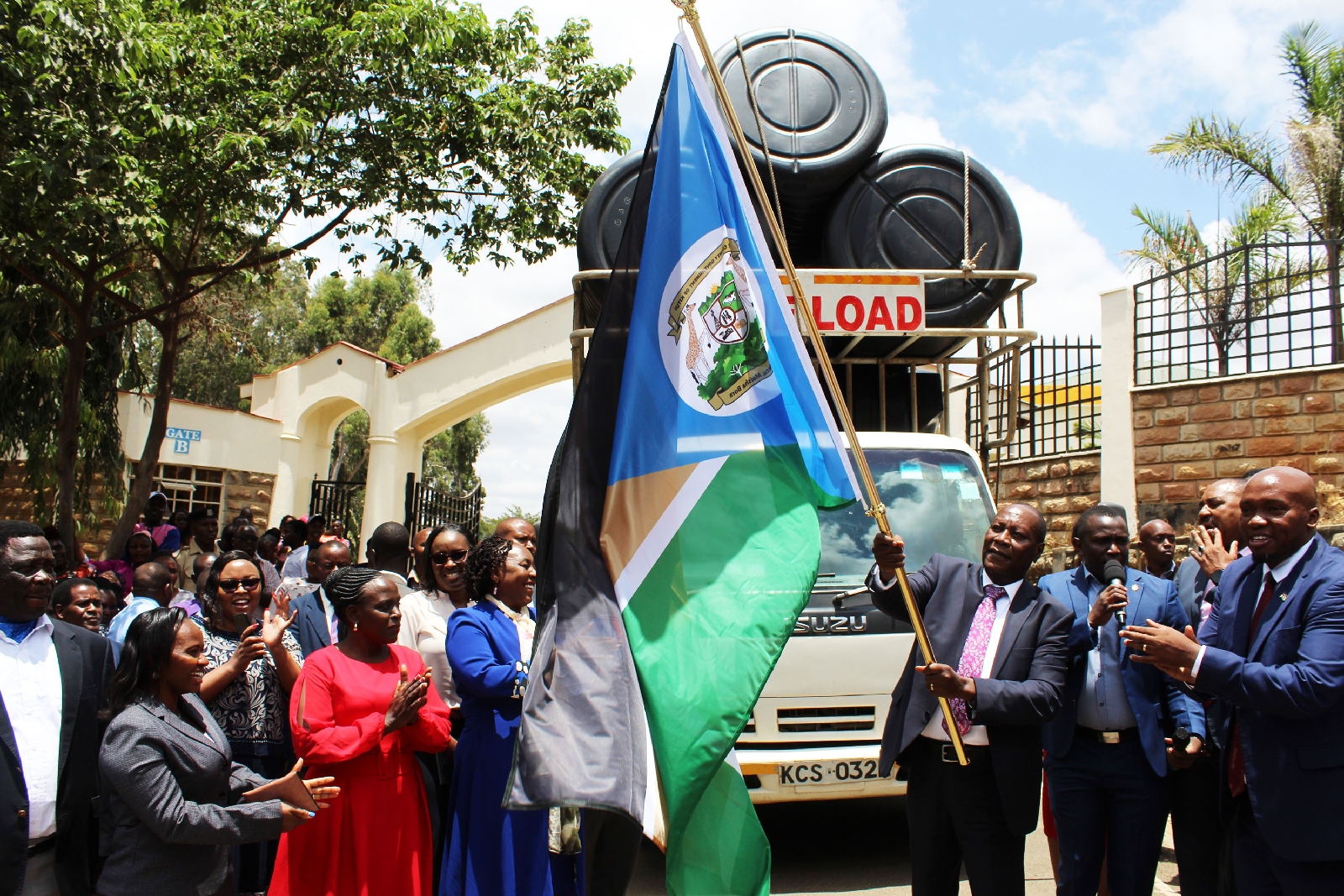BY PAUL MUTUA
Close to 2,000 lives changing programmes have been implemented in Kitui County for the last two-years and 10 months.
Kitui Governor Julius Malombe when he flagged off 164, 1000 litre plastic tanks donated by a coalition of three international donors supporting farmers to improve their livelihoods in Kitui at his office in September 2023.MWINGI TIMES|Paul Mutua
The programmes devolve in enhancing healthcare service delivery, access to clean water, road connectivity, basic and vocational education, food and nutrition security, urban development, trade and investments.
In his memoir to residents, Governor Julius Malombe, said since he resumed office in August 2022 he has overseen increase of health facilities from 306 to 311 in all the 40 wards, 3,806 patients served at the new Cancer Centre with 188 under treatment, 70 bed newborn units completed, 99 operational maternity units up from 81 to 2022 and 26 ambulances in operation up from 17.
Dr Malombe said infant mortality rate have reduced from 47 to 13 per 1,000 births, 11 laboratories and two X-ray units completed and 96 facilities stocked with anti-snake venoms.
The Governor said 347 sand dams have been done at his watch, 134 kilometer of water pipes laid and rehabilitated, 180 water tanks, 10,000 liter each distributed to various schools and public institutions, 55 boreholes drilled with 33 already equipped and 32 solar-powered irrigation clusters established in the expansive county with 247 villages.
“Some 989 programmes were implemented under the Community Level Infrastructure Development Programme (CLIDP) – a key initiative that I conceptualised during my first tenure as the pioneer Governor in 2013-2017. They are meant for equitable development, poverty alleviation and improvement of the livelihoods of the people in all wards and villages,” he said.
The county said 19 sump-wells were constructed, each producing appropriately 200,000 litres per day, 31 boreholes solarized and the Kangu Kangu water project to serve over 100,000 residents.
Malombe says these development projects are spread across the 16 priority sectors in agriculture, water, health, education, urban development, roads and construction, trade and investments, Micro Small and Medium Enterprises (MSMEs), cooperative societies, tourism and hospitality; women, youth and persons with disabilities, transport and bodaboda, energy, environment, climate change adaptation, forestry, natural and mineral resources, information and communications, and security sectors.
In agriculture, a total of 527,208 farmers have been trained on modern farming and livestock production technologies, climate-smart agricultural practices, agribusiness skills and value chain development to boost productivity and resilience.
The Governor said his leadership has prioritised the provision of agricultural extension and advisory services aimed at enhancing agricultural production, productivity, and profitability. He said extension services comprise individual and group farm visits, residential and non-residential trainings, farm field days, on-farm demonstrations, and farmer field schools by agricultural extension officers.
“The prioritisation of extension service is borne out of the realisation that governments, both national and county, cannot do farming for individual farmers. It is only individual farmers or those organised as cooperatives or business ventures who can effectively do so - whilst the government supports them with education, knowledge and capacity building on modern agriculture, including climate-smart agriculture,” he said.
Malombe said he is committed to leave a legacy of a prosperous county with vibrant rural and urban economics whose people enjoy a high quality of life and transformative strides in advancing the development agenda as he exits office in 2027.
“I am delighted to acknowledge that in my two years and ten months since assuming office on August 25 2022, my administration has provided the required transformative leadership in realisation of the county’s desired vision,” he said.
Malombe also reflected on strengthening collaborations with the National Government and development partners – all anchored in the County Integrated Development Plan (CIDP) 2023–2027 and “The Kitui Promise” - the 16- Sector Manifesto on whose basis the people of Kitui overwhelmingly gave mandate to his administration.
He further outlined the progress in critical governance areas, including budget performance, own-source revenue collection, settlement of pending bills, promotion of staff welfare, and county legal services.
“Further, I am passionate on the performance of the County Public Service, as well as the strides we have made in citizen participation, consultation, and engagement, as enshrined in Article 10 of the Constitution and Sections 47(3) and 92(2) of the County Governments Act,” Malombe said.
He briefly stated the challenges his government has encountered along the way, the mitigation measures being undertaken, and offered insights into kitui county's future plans.
Malombe said although they have made commendable progress in ensuring the safety of people, the efforts have encountered significant challenges.
He said the ongoing border dispute with Tana River County has delayed the construction of Katumba Police Station in Nguni ward, Mwingi Central. In addition, the recently completed Konakaliti Police Station in Mutha ward was vandalised, slowing down the collective mission of safeguarding the lives and property of residents in the bandit-prone areas.
Malombe said to address the setbacks, his administration has proactively engaged national agencies, including the Ministry of Interior and the National Cohesion and Integration Commission (NCIC) to fix the beacons along the well-established boundaries as per the 1992 Districts and Provinces Act and the Constitution of Kenya, 2010 – to help restore calm and pursue lasting, peaceful solutions to the inter-county boundary impasse.












 MWINGI TIMES for timely and authoritative news.
MWINGI TIMES for timely and authoritative news.
No comments
Post a Comment